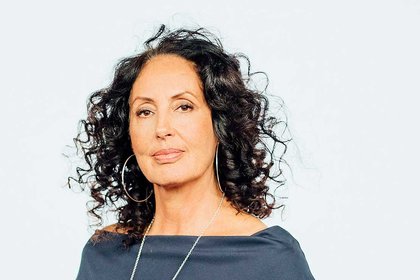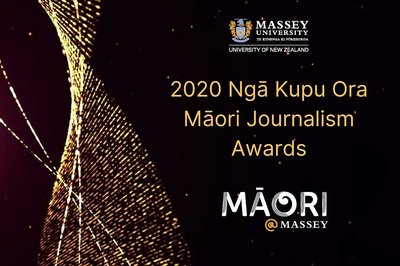
Supreme Award Winner Moana Maniapoto.
Massey University has announced the winners of the 2020 Ngā Kupu Ora Māori Journalism Awards. In an online hui on Thursday, Moana Maniapoto from Māori Television’s Te Ao with Moana was named the Supreme Award Winner for her interviews with Teina Pora and David Tamihere against the backdrop of the newly established Criminal Cases Review Commission.
Judge Mereana Hond said it was an exceptional piece of journalism that laid bare the inter-generational burden of institutionalised racism, profiling and questionable police and prosecution practices through the stories of two high-profile Māori men. She said, “Teina Pora and David Tamihere both say they are innocent. One has been cleared, the other has not. What a clever idea to bring them together to try to understand why. What fantastic journalism and access to be able to deliver on that whakaaro.” Ms Maniapoto won a cash prize of $3000 for winning the Supreme Award.
The other finalists in the Current Affairs English Category were Te Aniwa Hurihanganui from RNZ and Tania Page from TVNZ.
Massey University’s 2020 Ngā Kupu Ora Māori Journalism Awards recognises an outstanding commitment to the highest standards of journalism and storytelling within a kaupapa Māori context in the coverage of Māori issues and issues impacting on Māori.
The awards and the National Māori Journalism Hui that precedes them are organised by the Office of the Deputy Vice-Chancellor Māori and were this year hosted by broadcaster and Te Pūtahi-a-Toi, School of Māori Knowledge staff member, Stacey Morrison.
Deputy Vice-Chancellor Professor Meihana Durie says encouraging Māori media to thrive is a vital part of the University’s commitment to Māori. “Our facilitation not only celebrates excellence it also allows Māori journalists to come together to discuss the very large issues facing the industry. The hui discussions, especially around the desperate need for more journalists and accessible training opportunities, were rich and extremely fruitful and I think Massey can look to be part of providing some innovative ways to help meet those needs in the future. “

Ngā Kupu Ora Māori Journalism Awards.
The awards were judged by Al Jazeera Executive Producer Mereana Hond, Executive Director of Ngā Aho Whakaari, Māori in Screen, Hineani Melbourne and former a Māori Issues Correspondent at RNZ Chris Wikaira.
In the Best News Story in English Category the winner was Carmen Parahi from Stuff, for her story on the compensation and apology for injured servicemen George and Damien Nepata. She an each category winner won $1000. The other finalists were Mani Dunlop from Radio NZ and Meriana Johnsen, also from Radio NZ.
Kereama Wright from Māori Television was named the winner of Best News Story in Te Reo Māori for his exclusive into the rebranding of a mongrel mob chapter with a story entitled No more sieg heil. The other finalists were Rukuwai Tipene-Allen of Māori Television and Hania Douglas from TVNZ.
The Current Affairs in Te Reo Māori category was awarded to Whatitiri Te Wake, TVNZ for his story on the tikanga around Māori male hairstyles.
This year the judges also made a special commendation to TVNZ’s Marae programme for their Episode 5 which focused on the tangi of rangatira, Dr Huirangi Waikerepuru. The judges felt the programme was an innovative use of the medium of television at an unprecedented time with COVID lockdowns preventing traditional tangi. The programme embodied its very name to create a national marae where people could grieve and pay tribute in a uniquely Māori way.
So it was also fitting that the Te Tohu a Tanara Whairiri Kitawhiti Ngata Lifetime Achievement Award was awarded posthumously to Dr Huirangi Waikerepuru for his ground breaking work in helping establish Māori broadcasting through his efforts to revitalise te reo Māori. The judges acknowledged that his considerable passion and determination created the platform on which Māori journalists stand today.